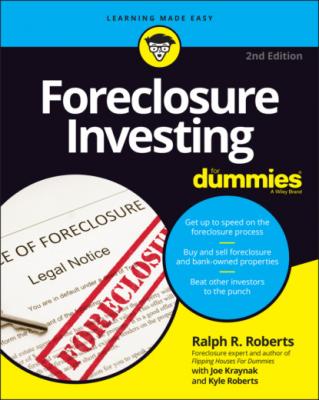ТОП просматриваемых книг сайта:
Foreclosure Investing For Dummies. Ralph R. Roberts
Читать онлайн.Название Foreclosure Investing For Dummies
Год выпуска 0
isbn 9781119861003
Автор произведения Ralph R. Roberts
Жанр Недвижимость
Издательство John Wiley & Sons Limited
Don’t let your agent or the word on the street pump up your expectations or estimates. Tell your agent that you want an estimated sales price based on reality, not hope. Provide your agent as many details as possible about the property to ensure that the estimate is based on truly comparable properties.
Investigating the situation and the homeowners
The more you know about the homeowners and their situation, the better able you are to assist them in extricating themselves from their current predicament. Unfortunately, homeowners who are facing foreclosure often feel isolated, ashamed, resentful, and defensive. They may not be very forthcoming about the details that landed them in their current situation, and they may see you as merely an opportunist who’s trying to sell their property out from under them.
In a way, they’re right. You do want the property, and you want to make a profit. But that doesn’t change the fact that the homeowners are trapped and need to explore their options. Your job at this stage is to convince the homeowners that they’ll see better results working with you than with someone who’s not quite on the level. In Chapter 9, I show you how to approach distressed homeowners and explain their options.
When you meet with homeowners, listen at least twice as much as you talk, and try to gather the information like the following that can enable you to provide more valuable guidance and assistance:
The total amount owed on the first mortgage and all other liens on the property, including any back taxes owed
The current monthly payment on the house and on any other outstanding loans
The names and contact information for all lienholders (lenders, contractors, and others who have a claim on the property)
The amount of time before the property goes up for auction
The value of any possessions the homeowners have that can be liquidated
A list of any family members who may be able to help
A clear idea of what the homeowners see as their options, such as selling the house, moving to a rental unit, relocating, or scaling down to a smaller house
This brief list can start you on your information-gathering mission, but as you talk with the homeowners, other issues and opportunities often present themselves. Create a thorough record of your discussions with the homeowners so that you can begin to paint a portrait of them in your mind. The more information you have, the more creative you can be in developing viable solutions. See Chapter 9 for additional details.
Setting and Sticking To Your Maximum Bid
Even the coldest and most calculating real estate investors become enthusiastic about properties. They may fall in love with a particular house or simply get so caught up in the heat of an auction that they bid too much for a property. Then they have to work twice as hard to make a profit on it.
In Chapter 10, I show you how to set the maximum price you’ll pay for a property when preparing an offer to purchase directly from homeowners. In Chapter 11, I lead you through the process of preparing a maximum bid for an auction and let you in on some strategies for effective bidding.
Taking Possession of the Property
When you buy a house, you usually expect to move into it on the agreed-upon date. You and the seller sign a purchase agreement in which the seller agrees to vacate the premises and turn over the keys on a specified date. Sometimes, the buyer requests possession at closing. In other cases, the seller agrees to move out one or two weeks later.
With foreclosures, the transfer of a property can be a long, drawn-out, and messy affair. In some areas, you take immediate possession of a property as soon as you offer the winning bid and pay the trustee or courtroom clerk. In other cases, the homeowners retain possession of the property for the duration of the redemption period, which can last up to a year in some areas.
Even when the redemption period is over, you have no guarantee that the previous homeowners are going to vacate the premises in a quiet, orderly fashion when their time runs out. In some cases, you can gently encourage the homeowners to move out. In other cases, you must have them forcibly evicted (by the sheriff, not you), which is always a painful process for all parties.
In the following sections, I provide an overview of what to do to take formal ownership of a property and eventually take possession of it. In Chapter 16, I reveal your responsibilities as the new owner and cover the eviction process in more detail.
Completing the essential paperwork
When you purchase a property directly from the homeowners, you and the sellers attend a closing in which a title company’s agent or an attorney shuffle all the paperwork and file the necessary records.
When you purchase a property at an auction or sheriff’s sale, however, you receive the deed, which you must then record at the Register of Deeds office to have your name officially added to the title. See Chapter 11 for details.
Paying property taxes and insurance
As soon as you purchase a property, either from the homeowners or at an auction, you become the official owner of the property, even though you may not be able to take immediate possession of it. As owner, you’re in charge of insuring the property and paying property taxes. Be sure to do the following:

